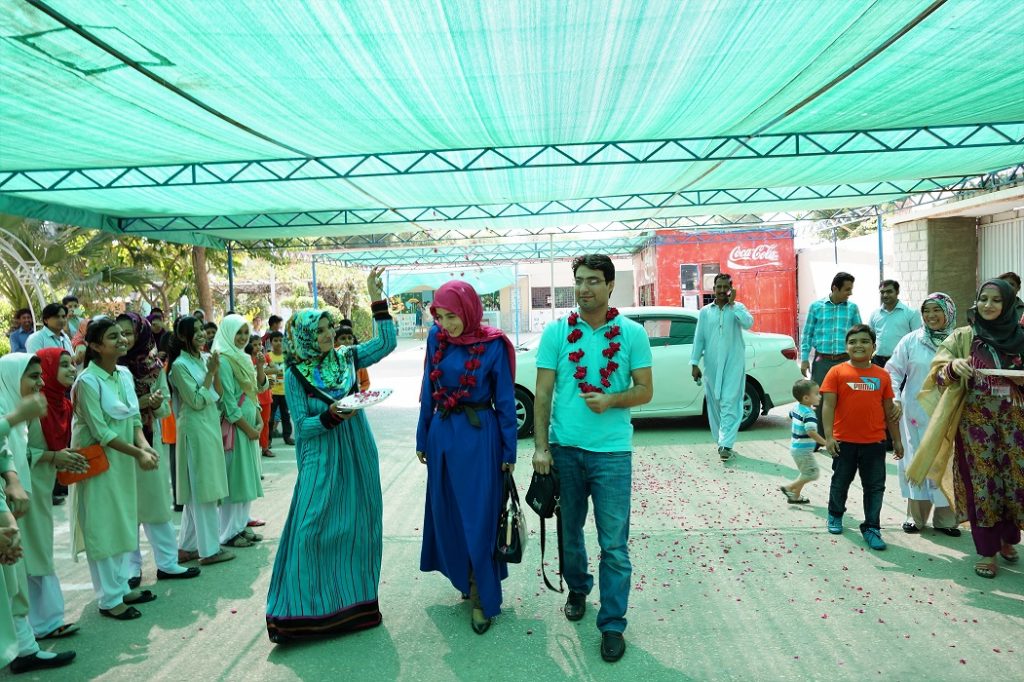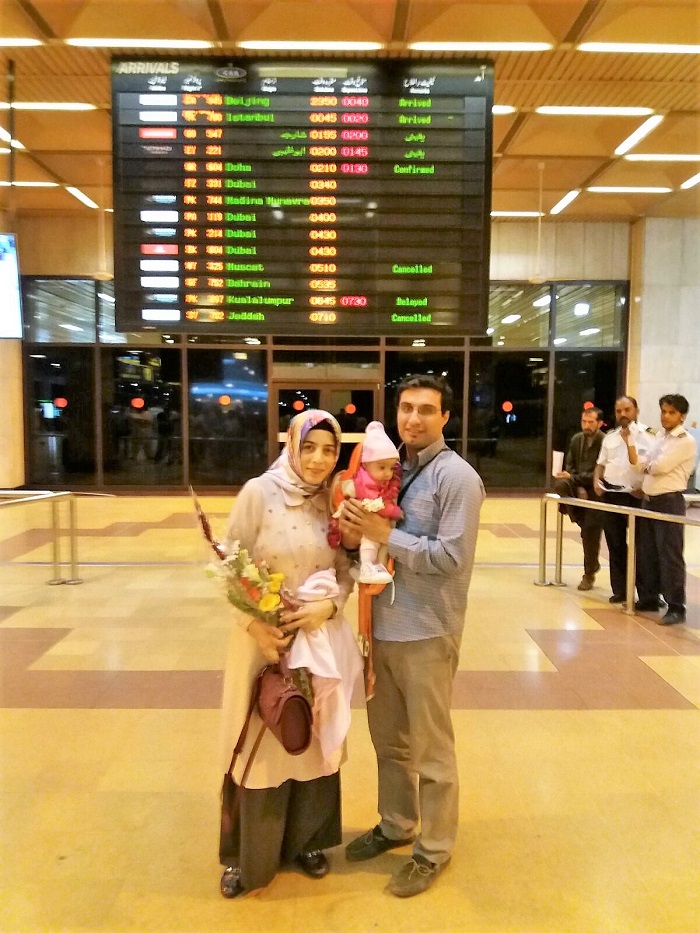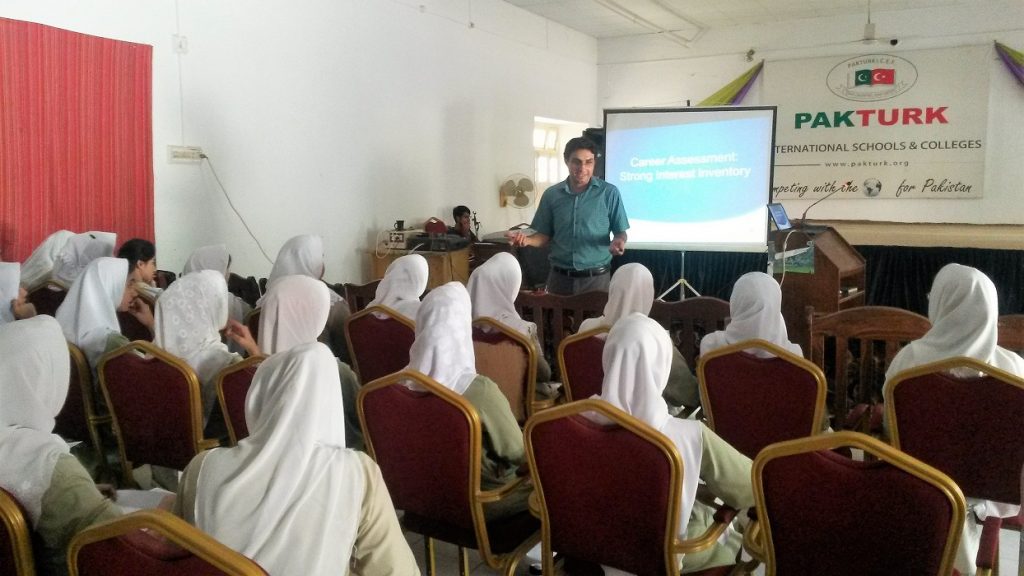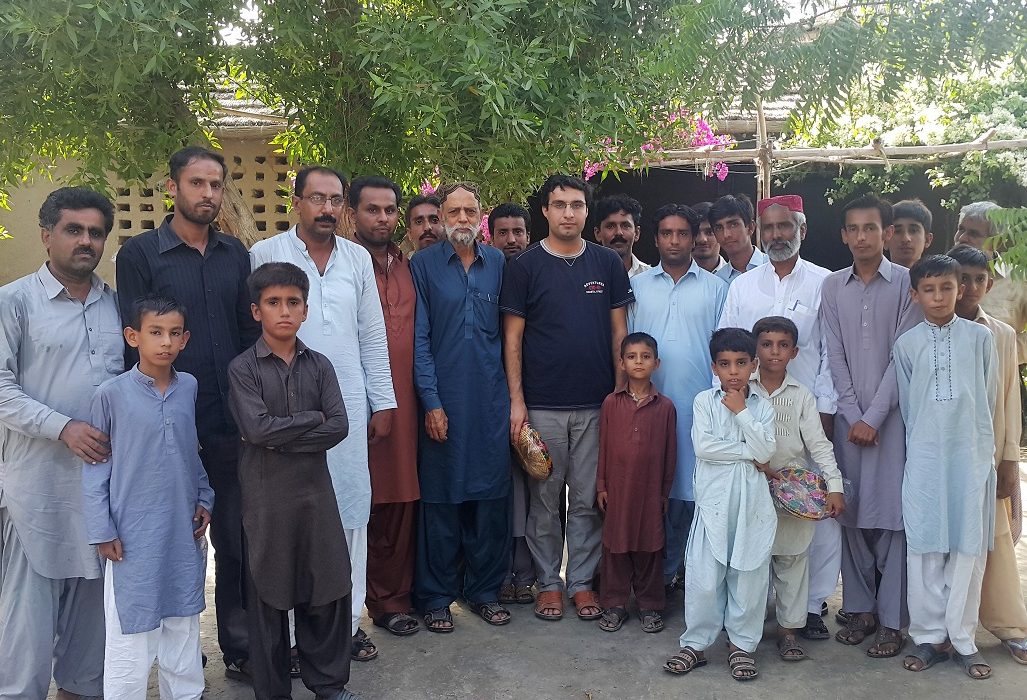Chemistry teacher Hakan Tokdemir (2): What made Pakistan beautiful for us was the people

A full-fledged annual night in Lahore
September 1, 2021
How did the Gülmez family serve breakfast to 50 people in one sitting at their Multan home?
September 4, 2021In the second and last part of our interview with PakTurk Schools Chemistry teacher Hakan Tokdemir, we talked about the years he lived in Khairpur Mirs, his marriage, the problems he experienced after July 15 and his life today. Explaining the unifying role of PakTurk Schools among the peoples in the country, Tokdemir also gave the answer to the question, “What makes Pakistan beautiful for you?”
What was Khairpur Mirs like for you?
When I was posted to Khairpur Mirs after Multan, our former principal called and said, “I don’t know if I should say ‘good luck’ or ‘may it fare well’ to you, my dear!” because there was a famous saying about Khairpur Mirs: “Whoever comes to Khairpur Mirs weeps twice; first when they come and second when they leave.”
Multan was hot but almost no wind blew in Khairpur Mirs. Power outages would last longer. I stayed there for the longest time in my life in Pakistan.
You had served in the most difficult parts of Pakistan…
This is a matter of fate. We never complained. Even now, my wife says, “If they post us there now, I will go again.” I got married while I was there. Khairpur Mirs is really a small city. You can go from one end of the city to the other in 5 minutes in a three-wheeled rickshaw. For me, the most beautiful place in the city was the large and lush lawn of our school, think about it. There were trees. It was a place where people could come and sit and children could play. Due to these limited opportunities, there were few factors that would connect us to the city other than our students. It was just us, our school and our students, that’s all. Khairpur Mirs was a place with limited opportunities, but it was very rich in terms of human resources. Very nice students graduated from there. The students were very friendly, hardworking and interested. We used to invite students to our homes or to the school dormitory and conduct additional education programs.
It rarely rained in Khairpur Mirs. As a person who loves rain much, I would feel the lack of it. Once I was with my students in a program. I went to my room to rest for a while. Meanwhile, it rained. When I woke up, I realized that it had rained. I was so disappointed that I still remember that day. I was like, ‘How could I miss it?
I presume your wife’s arrival in Khairpur Mirs was a hassle. Can you explain that process?
When we met, my wife was teaching Mathematics in Turkey. We got engaged when I went there on summer vacation. Two months later, I went back to Turkey for our wedding. We had our wedding on September 19, 2015. Two days later, I bought our return tickets to Pakistan. There was pressure on the Hizmet Movement in Turkey; nothing was serious in Pakistan, as yet. Something we did not expect happened and they did not issue my wife a Pakistani visa. I had to leave her in Turkey and go to Pakistan. The new semester was about to start. After a lot of effort, she got a visa and come to Pakistan after about a month. In Khairpur Mirs, our school principal and fellow teachers received her with garlands. They had prepared a small ‘welcome ceremony’ for her. My wife liked that very much. Khairpur Mirs was a difficult place in terms of living conditions, but my wife was very satisfied and very happy. When she was pregnant with our first daughter, she had serious medical problems.
Could she receive treatment? What did you experience?
Khairpur Mirs is a small place. There are limited health facilities. That’s why we suffered abundant ordeals with health issues. There was a central hospital, but it was not like we were used to. That public hospital was overcrowded and constantly occupied. When my wife felt unwell, I took her there for the first time. “We have to admit her,” said the doctors. She would remain at the hospital for some time, but my wife didn’t speak English or Urdu yet. None of her female friends could stay with her, because everyone had their own duty at the school. I had to stay and take care of her myself. They took us to a place like a maternity ward. There are about 30-40 ladies in the ward. There was no other man but me. They separated our bed from the rest with a curtain. Despite that, the ladies complained of my presence there. I wasn’t happy to be there in that way either, of course. Yet, we did not have a choice. My wife had to remain in bed constantly due to the high risk of losing the baby. She had to be admitted in the hospital because the medics administered periodical injections there.

I COULD HOLD MY FIRST CHILD 4 MONTHS AFTER THE BIRTH
It is almost a tradition to eat some cake while drinking doodh patti (tea wilk milk) in the morning there. One morning I told the attendant to serve everyone some cake and cups of doodh patti from me. The ladies in the ward were so pleased with this gesture that they never complained about me again. I could take care of my wife comfortably. My wife’s illness continued and we stayed in those conditions for a few days. She would not likely recover fully in those conditions. I admitted her to a better hospital in Karachi. She stayed in a hospital there for a week. I wanted my wife to be treated in Turkey, but the doctor wouldn’t allow because the trip would be risky. I risked everything and took my wife to her family on March 12, 2016. I returned to Pakistan, thinking I would go again before the birth.
Could you go?
Unfortunately, in the wake of the July 15 incident, I could not go to Turkey. I continued teaching at Khairpur Mirs. My wife gave birth attended by her parents. She was to come to Pakistan with our daughter, but the Embassy of Pakistan in Ankara did not issue a visa to the baby. We struggled a lot. We tried to reason with the authorities. Finally, when my daughter was 4 months old, she and my wife got a visa to come to Khairpur Mirs. My wife returned to Pakistan in October 2016, 8 months after she went to Turkey. Since the arrests were not intense at that time, this visa problem was a heavy experience for us. It was unheard of until that time to not give visas to infants. The child was born, the father could not travel, and the mother could not come with the child. Later on, our colleagues and other friends suffered such ordeals that our troubles proved simply unremarkable. That’s why we didn’t talk about them to anyone.
How did you feel the reflections of those ordeals at school?
One month after my wife arrived, on November 25, 2016, an official letter arrived from the Ministry of Interior Affairs to the schools and we as the Turkish staff of the PakTurk Schools were ordered to leave Pakistan within 3 days. We stopped working at the schools during that phase, but we were emotionally shattered. I will never forget the last lecture I taught. My students were weeping and I was weeping too while struggling to hold back my tears. I wished to teach my last lecture thoroughly. It was a profoundly emotional atmosphere. All our teachers and students were weeping.
Two weeks after leaving the school, our students hosted us on a farewell function, and I can never forget that. Everyone was weeping again. Our students came and told us about their feelings. One parent had arranged gold rings for each sister. She said, “Choose the one that fits on your finger and receive it as my gift!” Local teacher colleagues also collected money among themselves to help us. The parents likewise tried their best to help. It was truly a unique atmosphere which I will never forget for the rest of my life.
What did you do after leaving school?
We always had hope. Each of us said, “I wonder if we can start again and meet our students?” Khairpur Mirs was such a small place that all parents and shopkeepers knew us. We used to meet them on the road or in the market. They were sad to see us in that state. My wife and I did not want to leave Pakistan immediately. We stayed until the last moment to see if there was anything else to do. There were also colleagues who left within three days, but it was very difficult to leave in a short time. Afterwards, we applied to the UNHCR and explained our grievances. UNHCR officials handed us asylum-seeker certificates, which would normally take several months to process, in a matter of days. It was possible to stay in Pakistan for one more year under the UNHCR protection. We as a family stayed for 2 more years after that process, though. We had no issue with our passports. We wanted to stay there as long as we could materially and morally. It was something like a relay race. Colleagues whose passports were about to expire or who faced issues would leave. Every week we said goodbye to someone, wept and became sad. When it was our turn, there was no else left to leave.
IN AFRICA, I REALIZED PAKISTAN’S DISTINCTION
I found a job at another school. My wife worked in a hostel. We moved from Khairpur Mirs to Karachi in last 8 months in Pakistan. We planned to continue our life and career there. However, during the last days of December 2018, the Supreme Court of Pakistan transferred all PakTurk Schools to the Maarif Foundation. After that, we sold our belongings and left Pakistan within 3 days. We left Pakistan on January 1, 2019, to be exact.

How did you decide where to go?
While trying to decide, I prayed “O Allah, You know what’s in my heart!” I lived in hot climates and I never complained, but my heart wished to go to a rainy place this time. I simply could not express it. Meanwhile, friends kept on telling me, “Such-and-such African country is very beautiful, it rains there all the time.” Following their advice and by Allah Almighty’s grace, we went to that country. It rained there every two days. It was green, the weather was nice, and it was cool. It was a beautiful place, like a little paradise. We stayed there for two years. Africa has a different climate, geography and human resource.
It is very difficult to express your feelings while living in Pakistan. Only when you leave there is that possible. When I moved to Africa, I realized how distinctive Pakistan was. Pakistan has a special place in our hearts. The exquisiteness of the people who make the country beautiful… Being able to connect with people easily and values like these make Pakistan beautiful. Africa is beautiful too; we term our students here as our pearls. When we consider all factors, Pakistan is a distinctive place.
What do you remember about Pakistan? What did it add to your life?
What makes Pakistan valuable is the sincerity of the students, the respect they have for us, and the love of the parents and their appreciation of us. When we were expelled from our own schools, one parent called us and said, “The top floor of my house is vacant, you can stay there as long as you wish.” Our students tried to bring their pocket money and give us. The best of all, they didn’t forget about us. They still send very nice messages. This thing called love is not something that can be bought with money. This love is not such a simple thing. In Pakistan, this love and this sincerity is hard-achieved. This is a very exquisite acquisition. Maybe it’s because the cultures of two countries are similar. Whenever we had a gathering there and chatted, the children’s eyes would well up. I remember praying and reciting supplications with 30-40 students. While the children were dreaming about the future, they used to consult us. They respected us and truly loved us. All these values make Pakistan beautiful for us.
MY 5-YEAR-OLD DAUGHTER SAYS “I AM FROM PAKISTAN!”
We went to a place for dinner in the country where I worked in Africa. A Pakistani gentleman arrived. It was the first time I saw him, but when I saw him, I felt strange. Although I was not very fluent in Urdu, I had learned enough to handle my daily work. I spoke to him in Urdu. “You are Pathan, I presume!” I said to him and he asked, “How did you know?” I got it from his complexion. They used to mistake me for a Pathan while I was in Pakistan. How nice a place Pakistan was that it occupied a seat in our hearts. It left an indelible mark on us. My wife says, “I would happily go there if it was possible right now.”
When all of our friends left and we continued staying in Pakistan, we used to have phone chats with those who had left. “Know the value of Pakistan.” they used to say. I loved Pakistan too, but when I left, I realized those values better. Even my 5-year-old daughter responds to the question, “Where are you from?” by saying “I am from Pakistan!”
Some say that the peoples of Pakistan and Turkey have a long-standing mutual affection. Have you observed the reflections of this in Pakistan?
Yes, the people of Pakistan have always had a love interest for Turkey since the time immemorial. There are other aspects that make you valuable when you go somewhere with the motivation of the sublime cause of ‘service to humanity’. I believe in this. When you go somewhere as a normal person, they respect you and love you, but it is only up to a point. Since our education volunteer colleagues at PakTurk Schools went to Pakistan motivated the spirit of devotion and pure intention, that bond is different. There were also those who used to come to Pakistan for business, they received that respect, but because for those who went there with self-sacrifice, that love was enduring.
I will never forget: One day a student invited us to his house. He was an orphan. What would he offer us? What a rich table he had set for us! Whatever he could he did to place maybe 20 dishes on the table. No matter if they had financial crunch or not, people in Pakistan were generous and hospitable.
How was the interest of the students in education and learning? Were you reciprocated for your hard work?
I taught in three countries for over ten years. Children in Africa and Pakistan are keen on learning and academic knowledge. They wanted to make their dream come true to save their future. They strived. They knew the value of certain things. In countries with low financial resources, children do their best to make their dreams come true, because they have no other choice.

What changed in your thoughts and feelings when you revisited them before and after going to Pakistan?
I used to think going to a Muslim country would not count as ‘migration’ in true sense. When I came to Pakistan, I said to myself, “So it means that we have to come here too!” I then realized it was necessary to go to such countries. In these countries, if you do not hold children by the hand and do not guide them, there are several factors to influence them. They may find themselves in many unwanted avenues. When we went to some mosques in Quetta, the gatekeepers would say “There is a meeting here, you cannot enter!” Some people had serious sympathy for some political and Islamic groups. In those days, the city would be rocked by explosions almost once in a week or ten days. If you do not show children the right and rational way, others will utilize them for several political and terrorism purposes. Yes, there are many huffaz, but learning and practising the tenets of the Qur’an matter the most. I saw these places deserved to be served and worked. Some among our students were affected by extreme views, but we always alleviated them. Love, tolerance and dialogue are among the tenets of our religion. Without such representational values, there are always problems in practising our religion constructively in our societies. No fair outcome can be achieved with marginalization. We always endeavoured to explain this to our children. My students wrote letters to us during the separation process. “We love you so much, you teach us things our fathers didn’t teach us,” one had written.
PEOPLE FROM ALL WALKS OF LIFE COULD MEET AROUND THE SAME TABLE AT PAKTURK
Were there any activities you could do with parents and students from different backgrounds?
We also had parents of different religions. I was visiting them. They were very satisfied. Some even wished to donate occasionally on Eid al-Adha. Serious difficulties can be encountered in bringing different segments of society together. There are several examples to the aloofness among people from different provinces of Pakistan or people from different sects, but in our schools, children from different backgrounds were together. Our schools gave this feeling. We would talk about gathering around a table and about our humanity which made us all equally precious. Whenever we invited the parents to iftar functions, they all came no matter if they were from different religions or sects. These can be achieved only through self-sacrifice, not money.
Those children from different backgrounds would sit at the same table, play matches and listen to conversations. Isn’t the Hizmet for making this come true, too? A Hindu student of ours wrote a very respectable article about the Holy Prophet (PBUH). Aren’t these worthy?
Do you think your dreams and ideals are left unfinished by leaving Pakistan?
Just as said in a poem, “You sow seeds; if they do not grow, let the soil fret”, we went to Pakistan with a sublime intention, after all. Allah knows what is in our hearts. It is said “a believer’s intention is superior to their deeds”. The intention of all my colleagues there was to contribute to humanity to the best they could, to ensure universal peace, and to bring people together. We set out with this intention and we believed in these intentions. We did not intend to achieve anything; we set out on the road, seeking grace and favour from Allah. We may have stopped in Pakistan for some time, but I believe, we will continue. This will not remain halfway. Evil has never always persisted and the evil have always faced their bitter end. Since our colleagues acted for Allah, everything good will happen again if Allah grants His favour. We have not lost hope. Some places may be closed, but elsewhere they continue. Things that seem like evil may be auspicious, and things that seem auspicious may in fact be evil. We cannot know.
How do you make a living these days?
We had to leave the African country where we had been for some time because my wife was pregnant with our second child and we had heard the Turkish Embassy in that country did not process passport applications. We migrated to another African country where we thought we could get new passports. After my daughter’s birth, we went to the Embassy to get a passport for her. The officials demanded to see my wife’s passport and they confiscated it. They simply said, “The state had given you this, and the state has taken it away!” Unfortunately, they limited our range of movement. We were forced to stay here. I continue to teach in a school.
End.
Part One: Chemistry teacher Hakan Tokdemir (1): The good conduct of our students won praises from people





No Comment.